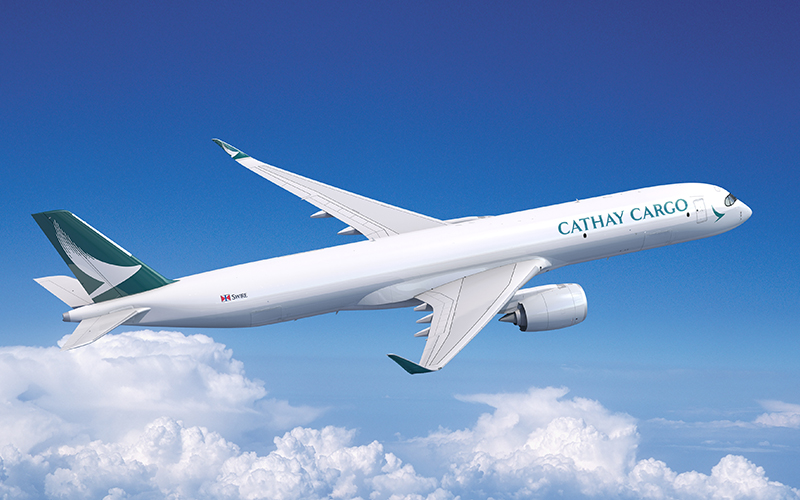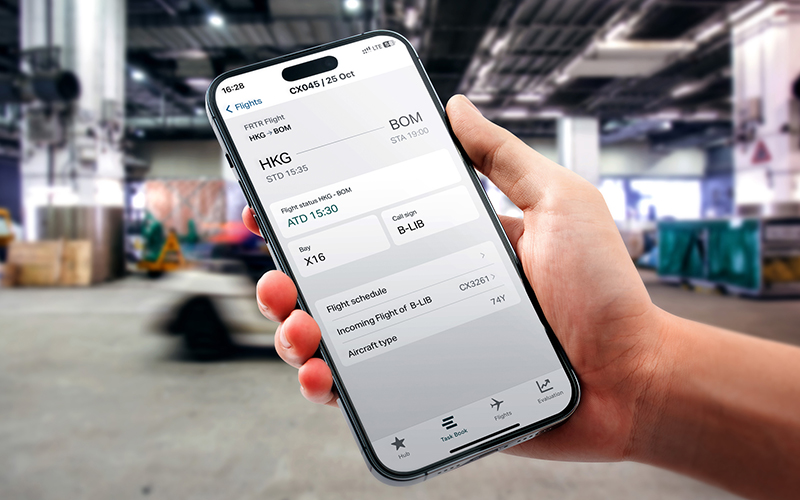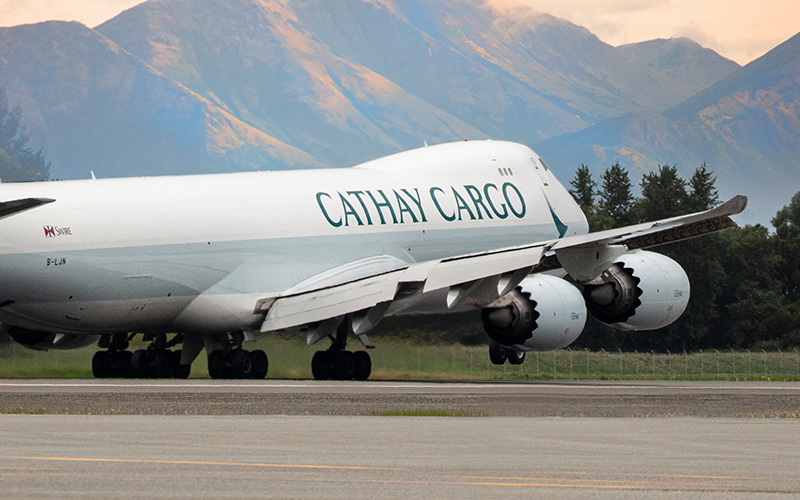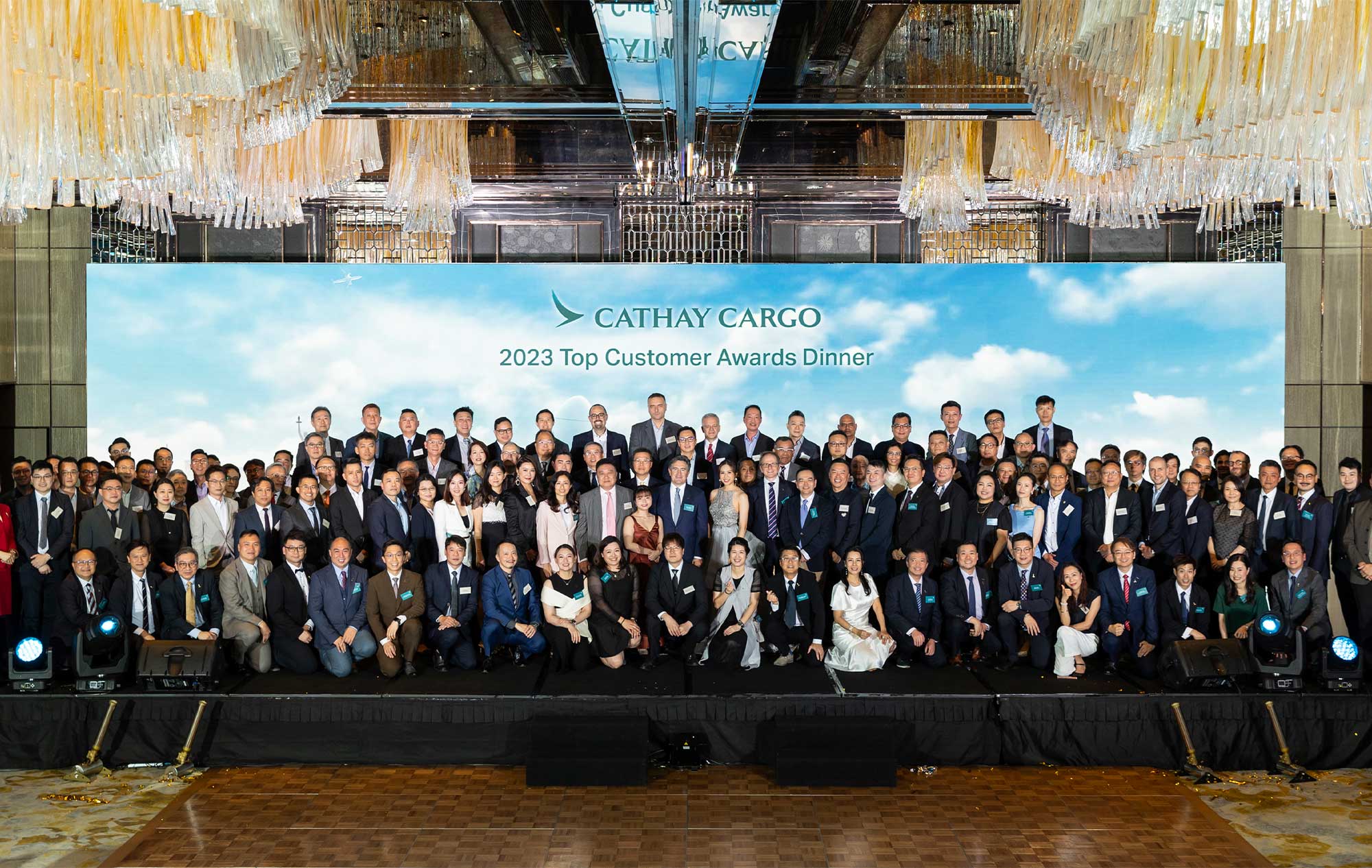How was 2023 for Cathay Cargo?
As with 2022, last year was a continuation of the normalisation in the air-cargo market in terms of yields and load factors from the highs of the COVID-19 period. From our own point of view, we returned our cargo capacity to around about 85 per cent of pre-COVID levels, which is encouraging, while I’d say the overall market was fairly challenging for traditional air-cargo sectors. We definitely felt some of the global issues around trade, consumer confidence and inflation, and some geopolitical issues didn’t help matters. That said, e-commerce has been an exception. Demand built and it finished on a strong note, which helped put our yields above 2019 levels, which was positive.
You also ended the year with an announcement of a new freighter deal
Yes, our order of the next generation Airbus A350F wide-body freighters illustrates the confidence we have in air cargo and in the Hong Kong logistics hub. The six initial aircraft plus the 20 purchase rights offer us the platform to flex our growth in years ahead. We currently fly 20 Boeing 747 freighters of which six are 747-400ERFs. We will continue to fly those ERFs and get quite creative about how we use capacity as we introduce the A350F – plus, the A350Fs’ fuel efficiency will contribute to our sustainability goals.

What is the market outlook for this year?
We are confident that 2024 will be a reasonable year for air cargo, led by e-commerce, a large amount of which is sourced from the southern part of the Chinese Mainland, so Hong Kong and Cathay Cargo are ideally placed. Potentially, e-commerce might take up to 50-60 per cent of our total tonnage. That said, we’ve still got big opportunities in growing special shipments where we feel we can be stronger. For example, we’ve got the capability, infrastructure, and skill sets to really do a good job with Cathay Pharma and Cathay Fresh.
What challenges and opportunities do you see for 2024?
The challenges are really no different to those every year. Cargo is a cyclical business, but it’s also one that changes pretty fast, which means we need to adapt quickly, which is something we honed during COVID-19. We’re confident that whatever the actual economy throws at us, we’ll be able to manoeuvre quickly using our people and assets to stay ahead of the overall market.
Other than that we’re still fairly early in the evolution of the story, but there may be opportunities from the events in the Red Sea and the rerouting of ocean freight. It’s too soon but fair to say that any prolonged disruptions to global supply chains on the ocean shipping side has a knock-on effect in terms of opportunities for air cargo.
What does Cathay Cargo have planned for 2024?
A lot. We will continue to build our brand consideration around specialist cargo, with a particular focus on our special shipment solutions. Given our investment in our capabilities and the yield premiums against e-commerce and general cargo, it’s a focus that will continue through 2024. We made good progress in 2023 with Cathay Mail and Cathay Pharma, while this year, we’re looking to relaunch our Cathay Expert solution for project cargoes; our Cathay Dangerous Goods solution, which is already something we do very well; and a refreshed Cathay Courier or Cathay Express solution will give us the third of three new innovative solutions that will help continue to differentiate us.
What about your plans for digitalisation?
We will continue to transform not only our own internal processes and mechanisms to sell cargo, but also in the overall cargo supply chain. We’re at the forefront of that working with the trade in Hong Kong and around the world to remove paper, improve automation and make it easier for customers to ship their cargo. We will continue to use technology to make our people’s lives easier and therefore improve our service excellence and consistency. For instance, our Cargo Connect app for our frontline staff will enable them to work quicker and better, and there will be more developments to that this year.

Will customers see more benefits from Cathay Cargo’s digitalisation programmes?
We want to accelerate the work to open direct links for freight forwarders to our selling system via APIs, so that we can bring our inventory and our space straight onto their systems so that they can book directly with us. This year we’re adding a ‘manage my booking-style’ functionality to the Click & Ship booking engine. That means customers will be able to not only book online, but change, cancel or amend bookings that they’ve already made.
We’ll also continue to improve our overall end-to-end digital experience for customers using our website, so we expect to see some significant enhancements around service, including upgraded track and trace, and information capabilities.

What’s planned for the operations and service side of the business?
In addition to the Cargo Connect app we’ve got various initiatives around enhanced screening for dangerous goods to manage risks more effectively. We will also have an internal customer experience team for the first time, who will be the go-to point for information about customers and ensure that the data they collect is used to fix service issues, enhance solutions and make sure we’re truly delivering to customer expectations.
We will also be looking at ground-handling to ensure that our third-party operators fully understand our brand and the standards we require to deliver operational excellence. Training our operational people and keeping them motivated remain key, and we hope to see some developments on training modules using virtual reality. We think we’ve got great people and we firmly believe that happy cargo people make for happy customers. We want to make sure we have the right training, the right motivation, the right terms and conditions, so that we get the brightest and best working at Cathay Cargo.
How are you developing your links with the Greater Bay Area (GBA)?
There are two main focuses. The first is continuing to build the intermodal hub at the Cathay Cargo Terminal in Dongguan. Exports are already established and we’re really looking at imports now and growing those volumes by raising awareness outside of the Hong Kong agent community and in the GBA and growing consideration across the network.
We’re continuing to grow our cooperation with the e-commerce giants based in the GBA through agreements to provide regular capacity. It’s also a reason we’re looking at our Cathay Courier solution with our partner Linex to develop long tail business with e-commerce giants and SMEs that need to fly stuff quickly by air.
We’re also reviewing our trucking opportunities, and we’d like to see growth in our own trucking capability for customers through the Cathay Cargo Terminal into not just the GBA, but further afield into the Chinese Mainland.
Hong Kong will be hosting the IATA World Cargo Symposium in the spring. What are your plans?
As the host airline, we’re supporting the event by providing transportation for delegates, and we’re also going to be heavily involved in sponsorships of various parts of the event, including the gala dinner. We’ll also supply speakers across various parts of the conference, which will based around three main themes: sustainability, digitisation, and safety and security. These dovetail into our own development plans and objectives for the coming years. On that basis, we hope to provide some keynote and panel speakers as well, so there’ll be a big Cathay component across the event.
It’s going to be great to showcase Hong Kong and its role as the busiest air-cargo hub in the world. I know many people haven’t been back since COVID-19, but we’ll show everyone that Hong Kong is very much back. It’s also a big opportunity to show our capabilities and we’re very excited about it.

What are the plans for the brand?
We’re going to build on the successful launch of our Cathay Cargo brand and the We Know How campaign last year. There will be more targeted campaigns focusing on our special handling solutions to shippers and forwarders. We’ll be a bit more honed in, explaining why ‘we know how’, and why we do things better. This will run alongside overall brand building in markets where we are still relatively unknown.

What is your message to customers as the year starts?
Our purpose is to carry cargo that matters to the world and our customers. We want to provide the very best levels of service and performance that we can. I think we’ll probably get a bit more pointed in our vision, and say we simply want to become the world’s best air-cargo carrier. We made great progress in 2023 around customer centricity, with good results, and a strong basis now built for that vision to be achieved. We will continue to work very hard to deliver what our customers need this year.








